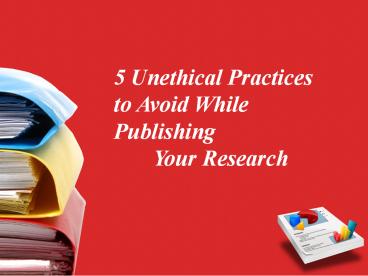Unethical Research Practices - PowerPoint PPT Presentation
Title:
Unethical Research Practices
Description:
Here is a list of 5 common unethical practices you must avoid while publishing your research paper – PowerPoint PPT presentation
Number of Views:1582
Title: Unethical Research Practices
1
5 Unethical Practices to Avoid While Publishing
Your Research
2
Unethical Practices in Scientific Research
- Performing a medical research and documenting the
findings in a research paper are painstaking and
time-consuming process. Nevertheless, the
research authors must conform to the scientific
ethics at each stage of performing a research and
documenting its results. - Ethics, derived from the Greek word ethikos
are a set of principles for right conduct in a
particular field. - They carry a greater significance in the field
of medical research and publication as these are
directly related to the suffering humanity.
3
- In recent times, there has been a gradual neglect
towards the ethical principles guiding
a scientific research paper writing, and its
publication. - The misconduct in behavior may be intentional or
may arise due to ignorance. Whatever be the cause
of misconduct, the consequence is the same. And
it not only affects other authors, reviewers, and
editors, but also the common man. - As a research author, its absolutely essential
to abreast yourself with these ethical principles
and avoid any scientific misconduct.
4
Here is a list of 5 common unethical practices
you must avoid while publishing your research
paper
5
1.Duplicate Submission
- Submission of your research paper or its
publication in two or more identical journals
with or without acknowledgement to another is
called duplicate submission/publication.
6
- Such a practice is done by authors to increase
their number of publications. - But, bear in mind! Its unethical as it wastes
the time of journal reviewers, publication
resources, and renders no benefit to humanity or
scientific community. - You can query multiple journals for submitting
your research paper, but finally submit to one
only!
7
2.Falsification/Fabrication of
Research Data
- Falsification is the manipulation of the methods
used in research or its key findings to produce a
desired outcome. Fabrication is the false
recording or recording of a fictitious data when
none exists.
8
- Such practices are more common in pharmaceutical
industry where results are fabricated to promote
a particular drug in the market, ignoring its
side-effects. - Not only unethical and wastage of limited
research resources, such fabrications have
negative effects on the physicians clinical
practice and creates mistrust amongst the
consumers or general population.
9
3.Plagiarism
- Plagiarism is the practice of using others work
or ideas in your scientific writing without
giving them due credit and passing them off as
ones own in publication journals to gain
recognition. Even using your own text from other
publications in the current writing without due
reference is considered plagiarism, more
specifically called self-plagiarism.
10
- If you think you are smart and your plagiarized
content will escape the eyes of the journal
editors, you are highly mistaken. Detection of
plagiarism has become easier with the advent of
numerous plagiarism checking tools. - Sometimes plagiarism is not intentional, but
happens accidentally. However, you can avoid it
by providing references of all the sources you
have used for writing your scientific content. - Always cite the author appropriately whose work
you use in your research paper, even if they are
from your past publications.
11
4.Authorship Conflict
- As per the International Committee of Medical
Journal Editor (ICMJE) guidelines, any person who
contributes to the conception, designing or
acquisition of research data, analysis of data,
drafting or revision of the article, and its
final approval before publication is entitled for
the authorship of that paper.
12
- Following unethical practices surmount to an
authorship conflict - Not including the name of the person who
contributes to the research in any manner. - Failure to obtain consent from a person whose
name is cited in the manuscript. - Adding an extra author or removing the name of an
existing author before or after publication. - Citing a person as an author just on the basis of
seniority, family or professional relationship
when none of them contributed to the research or
its writing. - The conflict can be prevented by deciding the
authorship in the beginning of the research.
Thats the reason why journals ask the authors to
submit their checklist for the criteria of
authorship.
13
5.Conflict of Interest
- Conflict of interest is a situation in which the
author of the research study may be influenced by
personal and/or financial considerations to
affect the quality or the end result of the
research. - If any such conflicts of interest arise, be they
personal, financial or any other, they must be
disclosed with complete honesty to the editorial
team.
14
- Though our publication support services experts
guidelines and principles exist to prevent any
misconduct in research and publication, ideally
you shouldnt require them. - Self-restraint and welfare of the fellow members
of the community must be the sole driving force
for conducting an honest research and publication.
15
For an Expert Publication Support
E-mail project_at_cognibrain.com
Phone 044-49595223 URL https//www.cognibrain.
com/































